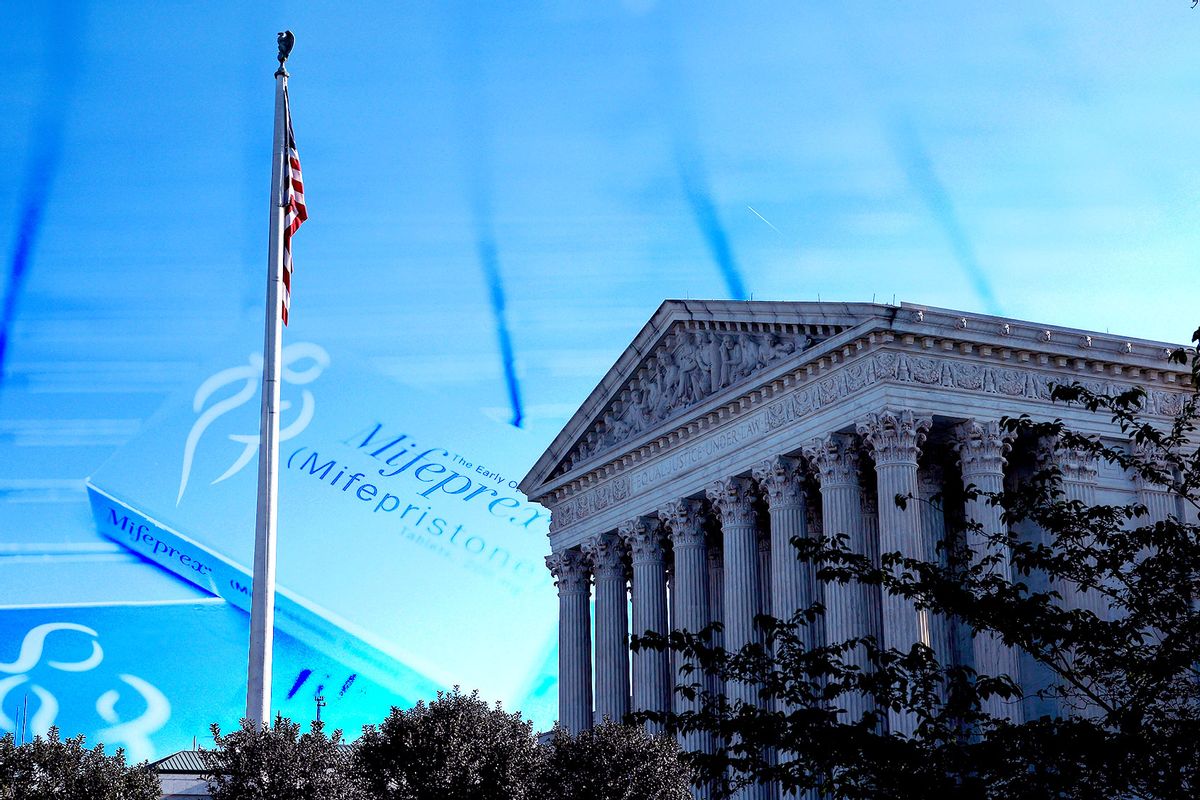On Thursday, the Supreme Court rejected a challenged restricting access to mifepristone, the first drug used in a medication abortion.
The court’s decision in the case U.S. Food and Drug Administration v. Alliance for Hippocratic Medicine ruled against Alliance for Hippocratic Medicine, an organization of anti-abortion activists backed by the Christian right-wing lobbying group Alliance Defending Freedom, who brought the case forward, with Justice Brett Kavanaugh writing the opinion for a unanimous court.
The court determined that the anti-abortion groups did not have legal standing to sue, but left the door open to future challenges to abortion drugs, according to NBC News.
"Despite this win at the court, the situation regarding access to these life-saving medications continues to deteriorate at the state level," the abortion access non-profit Plan C Pills said in a statement. "Louisiana’s recent bill designating both mifepristone and misoprostol as controlled substances, and Arkansas’ attempts to limit the provision of information to Arkansans about ways to obtain abortion pills in their state, are clear provocations. These unjust actions demonstrate that states will stop at nothing to keep pregnant people from accessing this basic medical care."
The Food and Drug Administration (FDA) approved mifepristone for the medical termination of pregnancy over two decades ago. Since then, the drug has held a well-established safety profile. However, a lawsuit filed in November 2022 alleged that the longstanding FDA approval should be revoked because it was based on incomplete data. Widespread access to the medication, the lawsuit claimed, put women’s health in danger. The plaintiffs, Alliance for Hippocratic Medicine, alleged that the FDA failed to protect women.
In April 2023, a Trump-appointed judge named Matthew J. Kacsmaryk of the U.S. District Court for the Northern District of Texas ruled in agreement with the plaintiffs, kicking off nearly two years of litigation around access to the medication.
Kacsmaryk’s controversial decision eschewed scientific fact and medical terminology in favor of right-wing activist jargon.
From the beginning, legal critics were quick to note how the lawsuit was anti-abortion propaganda — a political move to further restrict access to abortion post-Dobbs. Since Roe v. Wade was overturned, medication abortions have become more popular. A new Guttmacher Institute report from the Monthly Abortion Provision Study found that there were approximately 642,700 medication abortions in the United States in 2023, meaning they accounted for nearly 63 percent of all abortions.
In a medication abortion, a patient takes mifepristone, which blocks pregnancy hormones, and then misoprostol, which causes uterine contractions. The two-step regimen is also a common treatment in miscarriage management. In 2018, researchers published a study in the New England Journal of Medicine that found using both mifepristone and misoprostol in a two-step process was more effective for managing an early miscarriage than only taking misoprostol.
However, Kacsmaryk’s controversial decision eschewed scientific fact and medical terminology in favor of right-wing activist jargon. Likewise, his ruling ignored the majority of scientific studies on mifepristone and incorrectly stated that medical abortions are unsafe. After his ruling, the nations’ leading physicians emphasized in numerous amicus briefs that there was “ample scientific evidence” to support widespread use and availability of mifepristone. In February 2024, the peer-reviewed science publisher Sage Journals retracted three controversial abortion studies, two of which had been frequently cited in Alliance for Hippocratic Medicine’s lawsuit.
Want more health and science stories in your inbox? Subscribe to Salon's weekly newsletter Lab Notes.
The first significant way access to medication abortion could have changed in light of this ruling is the ability for mifepristone to be prescribed by telehealth and by mail.
Over the last couple of years telehealth abortions have become more common. In data from April 2022 to September 2023, 16 percent of abortions in the U.S. were done via telehealth, according to data by the Society of Family Planning. With those who had a telehealth medication abortion, 43 percent said that telehealth made it possible for them to have a timely abortion as the medicine is frequently delivered by mail.
The option to access medication abortions via mail or telehealth isn’t the only way the ruling could have impacted access to mifepristone. The timeframe that it can be used will shorten from 10 weeks to 7 weeks of pregnancy. This would have restricted access to medication abortion for those who perhaps haven’t even confirmed if the pregnancy is viable yet, or those who need time to gather the resources to even access the medications.
We need your help to stay independent
Additionally, a ruling in favor of the plaintiffs would have reverted access to the pill back to the 2000 label, which will require a higher dosage of mifepristone and a lower dosage of misoprostol. This shift in dosing will ultimately lead to more failures of the medication, and could lead to an abortion patient experiencing more nausea and cramping during the process. Essentially, it would have made the process more miserable and cause more suffering.
Read more
about reproductive health
- Will Roe v. Wade ever be restored? How certain legal challenges could reinstate abortion protections
- How the Texas trial changed the story of abortion rights in America
- In Wisconsin, women’s health care is constricted by an 1849 law. These doctors are aghast
- Groups sue to overturn Idaho "abortion trafficking" law targeting teens
- Idaho drops panel investigating pregnancy-related deaths as U.S. maternal mortality surges
- Texas can ban emergency abortions



Shares